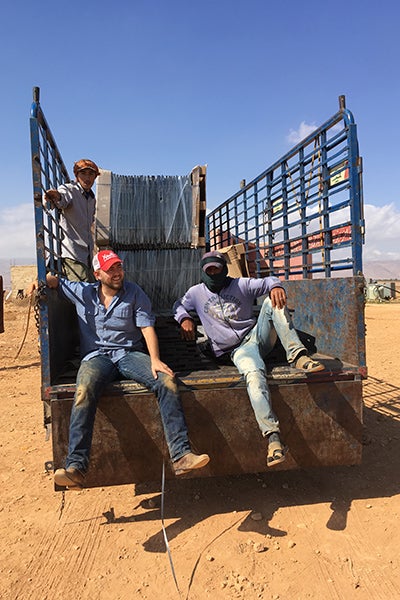The Heart of Shelter
A humanitarian nonprofit is working with displaced communities to put decisions about shelter in the hands of refugees.

Winter 2025
By Scott Pett '22

When Rice Magazine first featured Scott Key ’15 and Sam Brisendine ’14 in the Winter 2014 issue, they were graduate students in architecture with a big idea: Emergency Core, an innovative flooring product for refugee shelters. A decade later, that idea has grown into Every Shelter, a nonprofit that designs housing solutions for displaced communities and is transforming the landscape of refugee aid.
The duo’s journey began at the Rice Building Workshop (now known as Construct). When they learned a deeply troubling statistic — that refugees remain displaced for an average of 20 years — they began looking into the architectural conditions of disaster relief camps. One thing they picked up on quickly: Refugee tents often lacked flooring. To make a warmer, dryer and more comfortable space, Key and Brisendine designed a lightweight modular flooring tile that creates a thermal and moisture break between refugees and the ground.
Despite a successful pilot of their product in Lebanon, ultimately Emergency Core struggled for support from decision-makers in the humanitarian system. But that early failure yielded valuable insights. “We initially thought we were tackling a key aspect of the refugee experience,” Key explains. “But what we learned is that refugees know their needs better than we do. To make a more lasting impact, we needed to listen to them and prioritize their self-determination.” This insight reshaped Key and Brisendine’s entire approach. With the aim of transforming the humanitarian sector, they launched Every Shelter in 2018.
What we learned is that refugees know their needs better than we do. To make a more lasting impact, we needed to listen to them and prioritize their self-determination.
Every Shelter stands apart from other relief organizations. They take a market-based approach by using “Shelter Depots,” similar to hardware stores, where refugees can access essential materials and tools to improve their living conditions. Because there’s no financial markup or transportation, Shelter Depot products are affordable. And through a work-for-credit program, the most vulnerable residents of a refugee settlement can plant trees or do maintenance to procure items they need.
Every Shelter has focused on Uganda, widely considered the most generous refugee-hosting country in the world, with plans to expand globally. Their efforts gained recognition when the Nakivale [Uganda] refugee settlement representative of the Office of the United Nations High Commissioner for Refugees publicly endorsed their approach. “It was a moment of validation for years of hard work,” Key reflects. “There have been moments where we considered giving up. But there’s always been an open door that keeps us going.”
Many of those doors first opened at Rice, beginning with the Rice Building Workshop taught by Danny Samuels, a beloved former professor in the practice. Another came when Key and Brisendine joined OwlSpark, one of Rice’s student startup accelerators, which provided a foundation in business and entrepreneurship. Every Shelter’s connections to Rice continue to grow, thanks in part to events like an art auction at the new Cannady Hall and a panel hosted last summer by Rice Architecture alumnus Rob Rogers ’81 in New York on World Refugee Day. The nonprofit also runs an annual internship program that has recruited 15 students from Rice Business and Rice Architecture since 2019.
There have been moments where we considered giving up. But there’s always been an open door that keeps us going.
Today, Key leads Every Shelter as the CEO, while Brisendine remains active on the board. Their decadelong journey embodies Rice’s entrepreneurial spirit and culture of giving back. “Our time at Rice, especially in the architecture program, gave us the foundation to think critically and creatively about complex problems,” Key reflects. “It has also instilled in us the importance of perseverance and innovation.”
Editor's Note: This profile is part of an occasional series called "And Then What Happened?" where we check in with Rice Owls whom we've written about previously in the magazine, adding to and updating their fascinating stories for readers.
